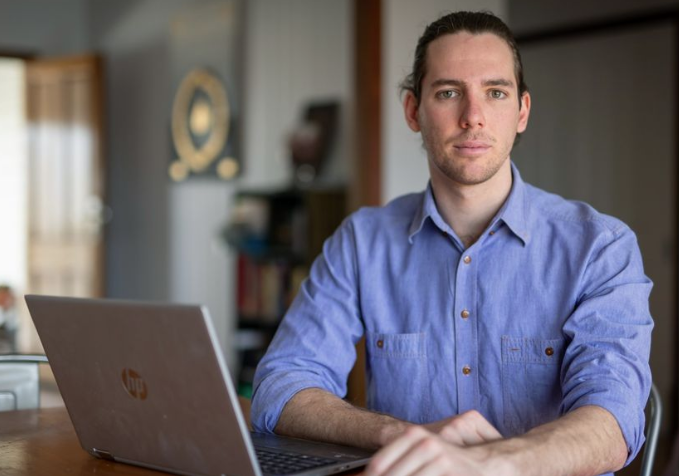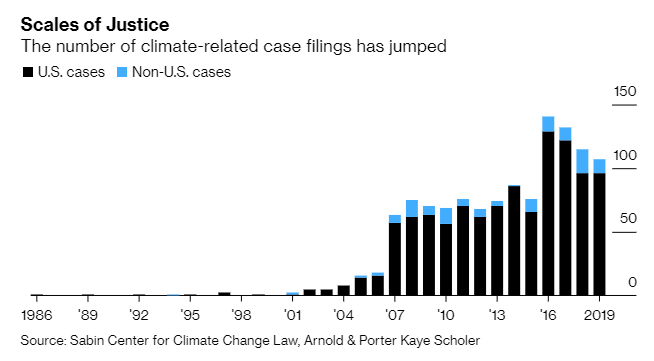Millennial Suing His Pension Fund For Not Being “Green” Enough
Bored with just plain old protests and interrupting political events to force their climate change virtue signaling onto the world, environmentalists are now using the legal system to harass those who don’t agree with their world view or aren’t “green” enough for their liking.
That’s what Mark McVeigh, a 24 year old environmental scientist from Australia has done: he is suing the $57 pension fund he is invested in with his retirement savings for “not adequately disclosing or assessing the impact of climate change on its investments,” according to Bloomberg.
The case will determine whether or not funds are in breach of fiduciary duties by failing to make investments that mitigate climate change.
Prior to filing the suit, McVeigh had asked Retail Employees Superannuation Trust, his pension fund, how it was “ensuring his savings were future proofed against rising world temperatures”. He didn’t like the answer he was given, so now he is suing.
McVeigh said:
“I see climate change as a huge risk that dwarfs a lot of other things — it’s such a big physical impact on the planet, and the economy.”
The fund says that climate change is one of the variety of factors it has to consider when investing on behalf of its 2 million members. Australia’s pension pool, which stands at about $2.9 trillion, is watching the case closely to see if the outcome will make it more difficult for funds to meet their already legislated minimum return targets.
Ian Patrick, chief investment officer at Sunsuper Pty, which manages A$70 billion, said: “Looking after the best financial interests of our members requires us to be conscious of the risks, but not exclude a whole segment of the economy that’s going to be very meaningful for a period of time. Right now, the interests of our members — the sole purpose of super — is what wins out.”
Other firms are also starting to act accordingly. One study by State Street Global Advisors showed that “fiduciary duty is one of the main ‘push factors’ for financial institutions to adopt environmental, social and governance principles.”
Other funds in Australia have employed “responsible investment teams” to try and mix environmental, social and corporate governance (ESG) factors into their portfolios. They have joined global investor initiatives like United Nations-backed Principles for Responsible Investment and have used their stakes in large companies to advocate for change.
Remember the days when you used to just choose your own investments, before the government told you what you had to invest in?
Mary Delahunty, head of impact at HESTA, said: “As soon as you remove capital, they don’t have to have a conversation with you anymore.”
Pension funds are also trying to mitigate climate risk using debt. Some funds have written loans to gas companies in the Permian Basin instead of taking equity stakes and bearing the risk of being junior on the capital structure.
Patrick continued: “Those loans deliver double-digit returns over periods of up to 10 years while the world shifts to a cleaner energy mix. It’s why we prefer debt and why we think about the tenor of that debt quite deeply. Relative to holding long-term equity in an energy asset, that addresses the risk quite substantially.”
Activism is still on the rise and banks are still shying away from investing in environmentally damaging projects, but the Australian government has moved in the other direction. Prime Minister Scott Morrison is instead “considering new laws to prevent activists like environmental lobby group Market Forces from stymieing commercial decisions and threatening economic growth.”
REST recently appointed a responsible investment manager and in June and took control of a wind farm in Western Australia.
“Specific climate-related issues which we engage with our investment managers on include carbon foot printing, stranded assets, climate-related scenario analysis and exposure to lower carbon assets,” a REST spokesperson said.
Michael Gerrard, a professor of environmental, climate change and energy law at Colombia University, said: “Success in litigation breeds imitation, so if McVeigh wins, people will take a close look. People are so desperate at the failure of governments to act adequately on climate change that they’re looking for litigation targets.”
The McVeigh case makes its way to court on November 22 for a preliminary hearing.
Tyler Durden
Thu, 11/14/2019 – 18:05
![]()
Zero Hedge’s mission is to widen the scope of financial, economic and political information available to the professional investing public, to skeptically examine and, where necessary, attack the flaccid institution that financial journalism has become, to liberate oppressed knowledge, to provide analysis uninhibited by political constraint and to facilitate information’s unending quest for freedom. Visit https://www.zerohedge.com


